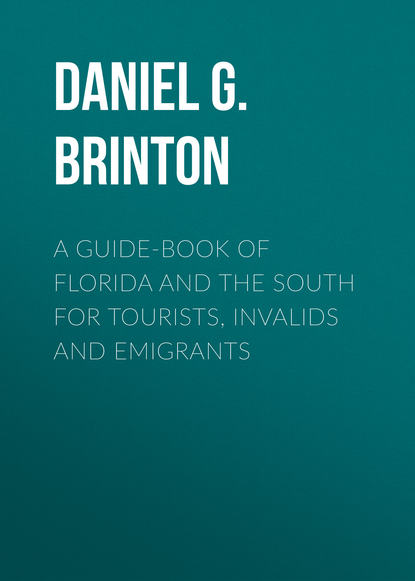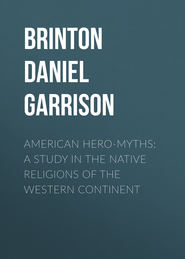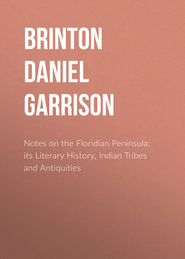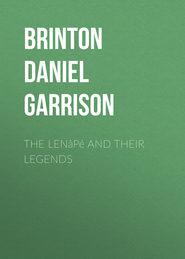По всем вопросам обращайтесь на: info@litportal.ru
(©) 2003-2024.
✖
A Guide-Book of Florida and the South for Tourists, Invalids and Emigrants
Настройки чтения
Размер шрифта
Высота строк
Поля
Bath Booms.– In Battle House, 50 cents; in Gulf City Hotel, 35 cents, and in a barber shop on St. Francis street, opposite the ladies entrance to the Battle House, 35 cents.
Restaurant.– Jenkins’, on Royal street, opposite the Battle House, is the best.
Bookseller.– Putnam & Co., 52 Dauphin street.
Livery Stable.– Hayden & Meenan, 39 Royal street, near the Roper House; carriage and driver, for half a day, $8.00; buggy, for half a day, $5.
Newspapers.– The Daily Register; the Daily Tribune.
Physician.– Dr. T. S. Scales, 128 Dauphin street.
Omnibusses meet the boats and cars, and street cars run on the principal streets – fare five cents and ten cents.
Theaters.– Mobile Theater, Variety Theater, both on Royal street.
The city (population 35,000) is situated about thirty miles from the Gulf of Mexico, on the west side of Mobile Bay. The bay is shallow and the channel tortuous. The rivals of the city say that the entrance is filling up, and will, before many generations, become little more than a marsh. The site of the town is on a sandy plain, elevated about fifteen feet above high tide, and is, consequently, well drained. The houses extend along the bay nearly three miles.
The city was founded by the French at the commencement of the last century, but remained an insignificant post until 1819, when it was incorporated. Since then it has grown with rapidity, and is now one of the most active cotton ports in the United States. Many of the buildings are handsome, and though the city suffered considerably during the war, it is rapidly regaining its former wealth. An excellent Directory has been published by the Southern Publishing Co.
The Custom House is the finest public edifice. It is constructed of marble.
There is a public square in a central locality, and the abundance of hedges of the Cherokee Rose, a flowering evergreen, gives the streets a pleasant appearance.
PART III.
CHAPTERS TO INVALIDS
CHAP. 1. – WHEN IS A CHANGE OF CLIMATE ADVISABLE?
In these days when the slow coach of our fathers has long been discarded, and steam and lightning are our draught horses, the advantages to health of a change of climate should be considered by every one. It is an easy, a pleasant, and a sure remedy in many a painful disorder. Need I fortify such an assertion by the dicta of high authorities? One is enough. “It would be difficult,” says Sir James Clark, M.D., whose name is familiar to every physician in connection with this very question, “to point out the chronic complaint, or even the disordered state of health which is not benefitted by a timely and judicious change of climate.”
Let me run over this catalogue of maladies and specify some in which “fresh fields and pastures new” are of especial value. All anticipate the first I mention – pulmonary consumption, – that dreaded scourge which year by year destroys more than did the cholera in its most fatal epidemics. Even those who lay no claim to medical knowledge are well aware how often the consumptive prolongs and saves his life by a timely change of air; they are not aware – few doctors with their diplomas are aware – how much oftener this fortunate result would be obtained were the change made with judgment, and the invalid to lend his own energies in this battle for life which his constitution is waging against disease. How to make this change with judgment, and how to employ these energies, these chapters are intended to inform him.
The watchword of the battle is: Courage. It is, indeed, not rare to see those who should have been left at home to die surrounded by home comforts, exiled by their wearied physician, or dragged by the ignorant solicitude of friends, late in their disease, to some strange land, there to meet their inevitable fate, deprived of the little luxuries so useful to them, served by unsympathizing strangers, far from the old, familiar faces. There are others who go early enough, and are earnest in their efforts to husband their flagging powers. But they have chosen a climate ill-adapted to the form of their complaint, they know not the precautions they should take, they have omitted provisions of essential value, in fine, they “die of medicable wounds.”
These examples should not discourage others. The medical science of to-day gives its strongest endorsement to this maxim: Consumption is cureable, IF TAKEN IN ITS EARLY STAGES. And in its cure, change of climate is an essential element. Nor does science hesitate to go farther. Even when the lungs are decidedly affected, even when the practised ear of the physician detects that ominous gurgling sound in the chest which reveals the presence of a cavity in the lungs, it still says Hope. We know that even then there is a good chance for life in many cases. Often the disease has invaded but a very circumscribed portion of lung and all the remainder is healthy; sometimes having gone thus far it seems to have spent its malignant powers, and rests for years, or disappears altogether; often under the genial influence of appropriate climate and regimen, the ulcer heals and health is restored.
Bronchitis is another complaint which calls for change of air. There are persons who contract a cough regularly at the beginning of every winter, which disappears only with the warm spring days. They hawk, and expectorate, and have pains in the breast, and a sore and tickling throat all the cold months. This is bronchitis, chronic bronchitis. Clergymen are very liable to it from neglect of precautions in using the voice. It is quite common among elderly people, and often paves the way for their final illness. In young persons it portends consumption. Nothing so effectually dispels it as a winter in a warm climate. I speak now from my own experience.
There is a disease not less common, hardly less formidable, often more distressing, more repulsive, than consumption. It is scrofula – that taint in the blood by which the sins of the fathers are visited upon the children unto and beyond the third and fourth generation. It often throws around its victims the charms of a strange beauty and a precocious, spiritual, intelligence. But the wise physician regards with anxious forbodings these signs so prized by loving friends. Here, too, a total change of air, diet, surroundings, is urgently, often imperatively, demanded.
One of the banes of our raw, damp atmosphere is rheumatism. It is painful, it is common, it is dangerous. In recent years we have learned that a fatal complication is alarmingly frequent in this complaint – organic disease of the heart. In examining for life insurance, we enquire particularly if the candidate is rheumatic. If the answer is affirmative, three times out of four we detect some unnatural action in this great centre of life. Now, it is well known how beneficially a warm, equable climate acts on sufferers with this malady. Let them, therefore, be warned in time to seek this means of prolonging life.
There is a complaint which makes us a burden to ourselves, and too often a nuisance to our companions. It is not dangerous, but is most trying. I mean dyspepsia, a hydra-headed disease, wearing alike to mind and body. The habits of our countrymen and countrywomen predispose them to it. In our great cities it is exceedingly prevalent. It, too, is always relieved, often completely cured by traveling – and often nothing but this will cure it.
The same may be said of those states of nervous and mental exhaustion, consequent on the harrassing strain of our American life, our over-active, excitable, national temperament. This exhaustion shows itself in the faltering step, the care-worn expression, the disturbed nutrition, in palpitation, in irritability, in causeless anxiety, and a legion of similar symptoms. Doctors call it paresis, and say that it is a new disease, a visitation of nature upon us for our artificial, unquiet lives.
There is an era in life when no actual disease is present, when the body visibly yields to the slow and certain advance of age. The mind, too, sympathises, and loses the keenness of its faculties. With most, this is about the age of sixty. It has long been noticed how fatal this period is. It is known as “the grand climacteric” in works on life. It has also been noticed that it is the winter months especially that are dangerous to persons at this age. The old Romans had this pregnant expression: “inimicior senibus hyems,” – winter, the foe of the aged. Modern research proves its correctness. An English physician, Dr. Day, calculating from nearly 55,000 cases over sixty years of age, discovered the startling fact that the deaths in January were within a small fraction twice as many as in July! Such an unexpected statement reminds us of that significant expression of another distinguished statistician who had studied closely the relation of mortality and temperature: “Waves of heat are waves of life; and waves of cold are waves of death.” With these, and a hundred similar warnings before us, we are safe in saying that in many cases entire relaxation from business and two or three winters in a warm climate about the age of sixty, will add ten years to life.
I now approach a delicate topic. A warm climate promises aid where medicines are utterly ineffectual. I mean in marriages not blessed by offspring. Most readers know how early females are married in the tropics. Mothers of fourteen and sixteen years are not uncommon. Heat stimulates powerfully the faculty of reproduction. The wives of the French colonists in Algiers are notably more fertile than when in their Northern homes. So we can with every reason recommend to childless couples, without definite cause of sterility, a winter in the south. I have known most happy effects from it.
CHAP. II. – WHAT CLIMATE SHALL BE CHOSEN?
This is a question of vital importance. An error here is fatal. Every person, every case of the same disease, is not at all suited by the same climate. Many an invalid who would survive for years, if he passed his winters in Florida, is sent to die in the cold, dry air of Minnesota; some who would find health at St. Paul, choose to perish at St. Augustine; there are some whose safety lies in the mountains, others who can find it nowhere but on the sea shore.
Neither patients nor physicians fully appreciate the extreme importance of deciding correctly here, and abiding by the decision. The invalid is apt to go where it is most convenient, or most agreeable for him to go. He goes where he has friends. He goes at his peril.
I have in mind the case of a young priest, the only child of his parents, loved by them as an only child is loved by the warm Irish heart. Before leaving the seminary, unmistakeable signs of consumption showed themselves. By assiduous care, he passed the winter comfortably, and as spring approached, his disease was checked. Every symptom abated. He gained in weight and strength. The cough nearly disappeared; the night sweats left him; his appetite returned. When summer opened, I said to him: “Go to the mountains. Complete restoration awaits you there. Avoid the sea shore. It is death to you.” I heard nothing more from him for two months. Then I was summoned in haste I found him with an irritative fever, with daily chills, with a distressing cough. He had been to the mountains for several weeks, and had improved so rapidly that he thought himself well, and concluded to join some friends on the Atlantic shore. He did so, and the result was before me. I then had the most painful duty of a physician’s life to perform, – that of informing a mother that her only child is beyond human aid.
And here I must say, with all deference to the faculty, that the ignorance and carelessness of physicians in reference to this matter of climate are at most reprehensible. Few of them make any distinction in cases. They send all consumptives to Minnesota, or to Texas, or to Florida, or to Cuba, as if in every instance what is sauce for goose is also sauce for gander. Thus it happens that the most eligible climates gain a bad reputation. They suit many, perhaps most, but they do not suit all. Go to Nice, Naples, the Isle of Pines, you will find invalids who unquestionably, were they at home, would be in a better place. This is chiefly the fault of their physicians. When a doctor recommends a climate, and yet is unable to tell you its temperature, its moisture, its prevailing winds, its seasons, its local diseases, its articles of food, its water, its mineral springs, its accommodations for travellers – beware of him. He is a dangerous counsellor. These facts the physician must know to advise wisely.
There are others which he must learn from the invalid himself. Constitutions are differently affected by climate, and so are cases of the same disease. Some climates are sedative and relaxing, others tonic and bracing; some are moist and soothing, others dry and steeling. Some constitutions are nervous and irritable, others torpid and sluggish; some have plenty of latent force which needs use, in others the vital powers are naturally weak, and must be carefully husbanded. In some cases, the symptoms are of an inflammatory, in others of an atonic character; in some, the secretions are scanty, in others profuse; in some, considerations of diet are of great importance, in others they do not enter; in some, the cough is importunate, in others, hardly annoying – and a hundred other differences might be added. The question is a complicated one. It asks for its solution the utmost care of the physician. It almost demands the trained skill of the specialist.
I repeat, therefore, that no climate can be recommended indiscriminately to all; that the climate must be selected by an intelligent physician who has carefully studied the case; that the locality which brings life to one, brings death to another; and, therefore, that having decided on a change of climate, it is of vital importance to select the right one.
The decision between a warm and a cold climate must be made somehow thus: If you have usually borne cold well, if you have not been subject to cold feet and hands, and disagreeable chilliness; if you are accustomed to out-door exercise in winter; if you are not subject to catarrhs, pneumonia, pleurisy, coughs, irritation of the pharynx; if you are not plethoric; if you are free from rheumatic, neuralgic or gouty pains which become worse as winter approaches; if your throat is anæmic rather than congestive, and your liver torpid; if your health is not already too much reduced to stand the icy winds of the north; if you prefer winter to summer, and the cold to the hot months; if heat oppresses you and enervates you; – then if you want to change your climate, go to Minnesota, to Labrador, or the Canadian highlands. But no, this is not all. Have you a fancy for any particular spot among those famous for salubrity? Is there a pastime or pursuit to which you are addicted? Do you love to boat, fish, hunt, ride, camp out, botanize, photograph? Indulge your taste. Such considerations have quite as much weight as many a medical reason. Then there is the question of money. If you carry the cares of business with you; if you have to pinch and spare on your journey; if you are worried about your expenses, the trip will do you little good, I have tried to give accurate accounts of the cost of living in the South, so that a traveler may know what to expect there.
All these matters have to be weighed, and from them a conclusion reached as to what climate is best. It is a complicated question, and it is not enough that the doctor make his diagnosis and then oracularly pronounces the name of some locality as that best suited for your disease. It is easy for him, but it may turn out hard for you.
CHAP. III – WHERE IS THE BEST SOUTHERN WINTER CLIMATE?
In studying this question of climate, more particularly with reference to those who suffer from diseases of the throat and lungs, I have taken some pains to satisfy myself whereabout in the South those of them whom a Southern climate suits will find the most eligible climatic conditions in winter. I shall give the result of my studies, though for reasons which will soon appear, it is of no great use just now. I build for the future.
The model climate for such invalids must satisfy four conditions. It must have an equable temperature, moderate moisture, moderate and regular winds, and freedom from local disease.
First about temperature. Here the mere amount of heat or cold is not so much to be looked at, as what meteorologists call the range. The thermometer should show no great difference in the day and the night, or between one day and another. Sudden changes should not appear on the record. Warmth is desirable because it leads to a life in the open air, prevents chilly and close rooms, and soothes the irritable air passages. Heat above seventy-five degrees Fahrenheit is objectionable, because it is debilitating, and hinders exercise.
In the United States, Key West has the warmest climate and the least range. Its mean annual temperature is 76°.5; its range 52° Fahrenheit. This is rather too hot. Nor is it free from some other objections. The island is small, barren, and uninteresting; there are no rides and drives, and violent winds from the north and northeast occur more or less every winter.
Many have lauded the climate of Texas. It is true that the hottest portions of that State have a mean annual temperature of 73°. But then the winters there are as cold as in Southern Georgia, and the range is nowhere less than 70°, and generally 80° to 90°. Then there are the “northers,” chilling winds from the north, which reduce the temperature 10° to 20° in a few hours. In fine, the climate is much less equable than on the south Atlantic coast. The winter temperature of most of Texas is as low as that of South Carolina.
This is too low. The mean temperature of Charleston, S. C., is 66°, the range nearly 95°. At Savannah the temperature of the year is 65°, the range about 90°. The summers at these points are hot, the winter months often cold, damp, and raw. It is precisely these months, and these only, which interest us just now. To present the matter more fully I extract the following table from the Medical statistics of the U. S. Army. It is based on careful observations extending over many years, and shows the temperature of each of the winter months in a number of places in the South:
Corpus Christi is the hottest place in Texas; yet its winters are colder than on the eastern coast of Florida, and its annual range is 70 degrees. The highest winter temperature observed anywhere on the mainland of the United States was at Fort Dallas on the Miami river, and at New Smyrna, some miles north of it, both on the east coast of Florida. Furthermore, their range is less than anywhere else. During four years that the army officers watched the thermometer at Fort Dallas, the highest point reached by the mercury was 95 degrees; the lowest 35 degrees; a range, therefore, of 60 degrees in four years.
I conclude therefore that the most equable climate of the United States is on the south-eastern coast of Florida.
I shall dismiss the second condition in a few words. Moist warmth is soothing; dryness is irritating; every one who has worn a poultice knows this. A moist, warm air, moderately charged with vapor, or even approaching a saturated condition, is therefore, as a rule, most agreeable to the air passages, and the general comfort. In winter, all along our southern seaboard the air is moist; it is sufficiently warm and moist both, nowhere but in southeastern Florida, as the table of winter temperatures shows us.
A moist atmosphere is not always a rainy one. A rainy climate, no matter what other conditions it may have, is a detestable one. Southern Florida has a hot and rainy season from May to September. Everything moulds, and drips, and steams. The rainfall averages every year from forty-five to sixty inches. But nearly all of it falls in the summer months. In December, January and February, two, two and a half, and three inches a month are an ordinary average. This means that the weather is much more generally fair than foul.
The third condition is the prevalence of moderate and regular winds. I have already hinted about the Texan “northers.” Similar windstorms occur throughout the Gulf States. I have felt them disagreeably at Key West, though there the tepid waters of the Gulf of Mexico temper their blasts. Sometimes they blow violently for thirty-six or forty-eight hours. On the southeastern coast of Florida they are both warmed by the Gulf, and lessened in violence by the woods of the peninsula. The winds there are in winter usually north, northeast, and northwest. In summer a breeze from the sea sets in about ten A. M., which often reduces the temperature about six degrees in ten minutes, without causing other than a pleasant sensation. At night a land breeze blows off the land.
The occasional cold winds in winter are an objection from which no part of our southern country is wholly free. Moderate winds are essential to the purity of the atmosphere, and these generally prevail along the Gulf.
The fourth condition of climate is a vital one. I have witnessed the results of months of care destroyed by a single attack of intermittent fever. I have already stated that miasmatic fevers are extremely common in the interior of Florida during the summer and early autumn, but they do not occur on the sea coast during the late autumn and winter.
This is especially true of southeastern Florida. Portions of our army were stationed there during all seasons, for a number of years, and the testimony of the army surgeons is unanimous and most favorable. And let me here remind the reader that the surgeons of the United States Army are thoroughly educated physicians, of unequaled experience in all the variety of climate which our country presents, and who, having no quarter sections to sell, or other axe to grind, give their evidence with the utmost impartiality. Here is one quotation from a report to the Surgeon General, dated at Fort Pierce, on Indian river: “This post has a climate, in every respect, perhaps, unsurpassed by any in the world.” And these are the words of Dr. R. F. Simpson, U. S. A., writing about Fort Dallas, on the Miami, the very spot I have been maintaining approaches nearest the model climate for consumptives: “I have been on duty at most of the posts in Florida, but none compare with this for salubrity.”











